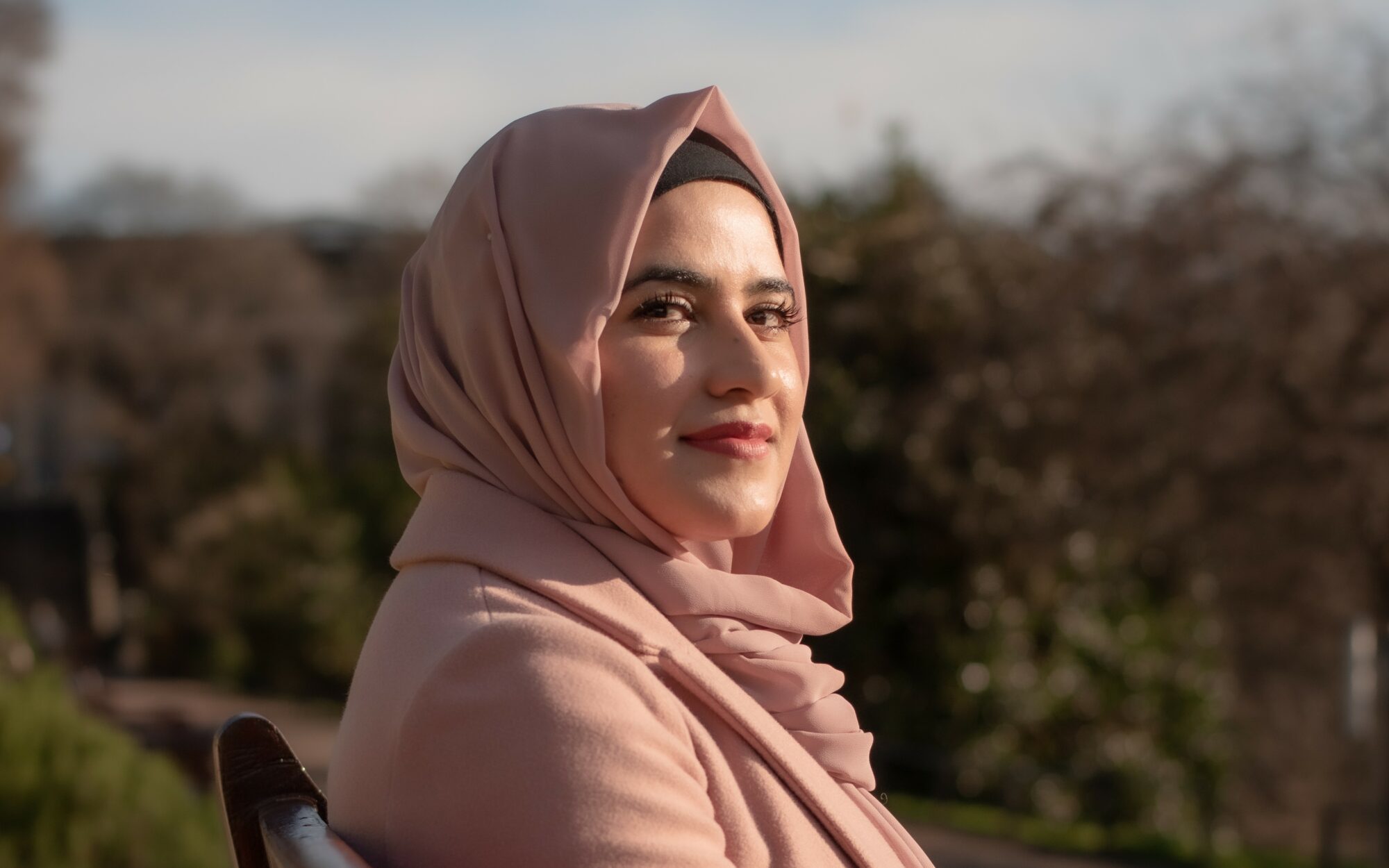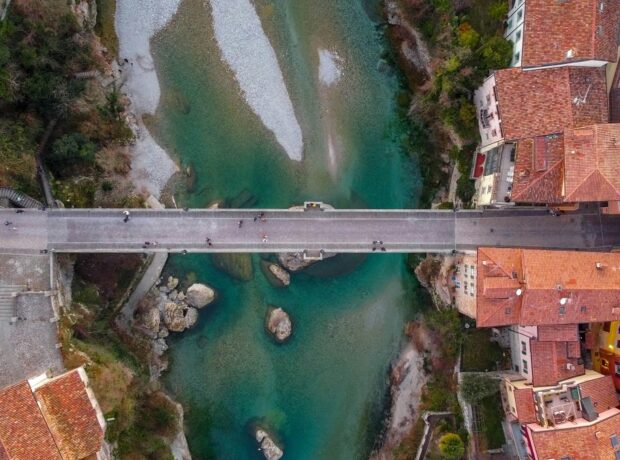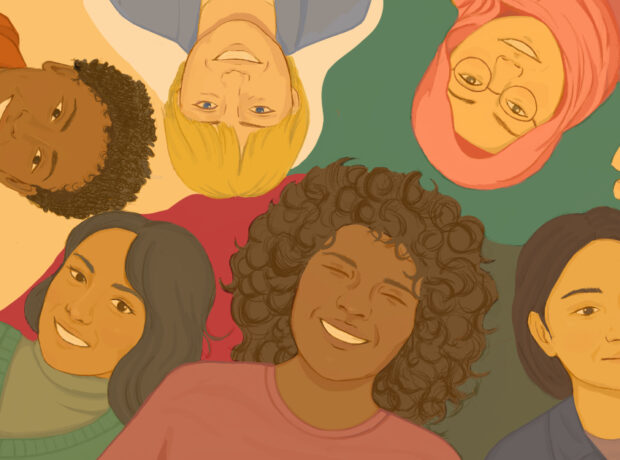When the Taliban shot Malala Yousafzai, her school friends Kainat Riaz and Shazia Ramzan were also injured in the attack. Ten years later, they tell Nour Ghantous about their journey.
October 9, 2012 – Coming home from school
The van was stuffy, but the schoolgirls barely noticed – they were busy discussing other things. Shazia, 12, had had an examination that day. She sat exhausted, daydreaming about what she’d do when she got home. She was sitting between Kainat and Malala, whose dad was the school’s headmaster. When the Taliban announced that girls could no longer be educated, Mr Yousafzai, along with a team of dedicated teachers, kept the school running on the quiet. Like his daughter, he spoke openly about his opinions of the Taliban to media outlets. Shazia admired their bravery.
Trundling along, they would every so often jolt to a stop and a passenger would hop off, after which both the van and its travellers would resume their chatter. So, when the Taliban stopped the van midway through its journey, the girls didn’t take much notice. And when a militant-looking man stepped on board, they only really had time to be confused.
“Who is Malala?” he asked the now stunned-silent cohort. They blinked back in shock, but a few heads turning towards Malala was enough indication for the man to start shooting in her general direction.
A bullet hit Malala in the head. Another hit Shazia’s left shoulder, and another her left hand. Kainat was shot in the shoulder too.
Shazia and Kainat can’t recall much of the frenzy afterwards, except thinking that wearing white was an unfortunate choice and that the panicked – albeit heroic – van driver had started driving again. (He did not stop until he reached the hospital.)
The events that followed would see Malala’s life spin into a whirlwind of hospital beds, global acclaim and ultimately, a Nobel Peace Prize.
She was taken to the UK, to Queen Elizabeth Hospital in Birmingham, for treatment. During her recovery, Malala was offered a scholarship to study at Atlantic College, a prestigious Welsh boarding school, but she had already accepted a place at Birmingham’s Edgbaston High School for Girls. Instead, Malala suggested Atlantic College offer the opportunity to Shazia and Kainat. The girls would start new lives in Wales, but only after learning the hard way that staying in Pakistan’s Swat District was no longer an option.
Read more: Interview: The dissenter – Asma Jahangir speaks about NGOs in democratisation in Pakistan
Growing up
Shazia recalls her most vivid memory from home. “I still remember the wait for the van after school. It would be so hot outside, so whenever someone would use the water cooler, they’d splash the girl beside them, who would splash the girl beside her, and then everybody would get involved. School would be shut by then, so we’d all run up and down the halls laughing, splashing water on each other, and waiting for the van. Those were good days.”
Asked what she misses most about life back home, Kainat says: “My childhood. In Pakistan, things are so different. We have so many relatives to visit and share culture and tradition with. That was a special thing for me when I was a child.”
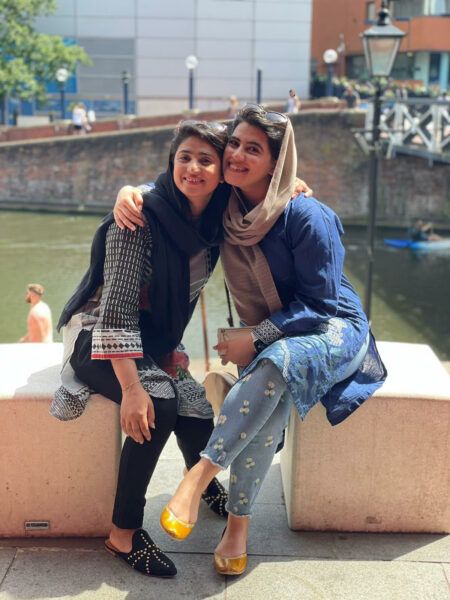
Shazia Ramzan and Kainat Riaz
During her first years at the college in Wales, Kainat says it was obvious she had been plucked straight from Swat Valley. She recalls deep insecurities watching classmates adopt new styles and try on the various hats of adolescence, while she couldn’t bring herself to change out of her shalwar kameez.
But she had already grown up by then. The national dress she wore every day brought her a sense of comfort and identity in an entirely unfamiliar environment, one that her classmates were probably still searching for.
“We were children before the incident,” she says. “But afterwards, and at such a young age, we became so mature, so independent. I have good memories in Pakistan. A lot of them. But that was it for my childhood. It ended in 2012.”
Kainat and Shazia were 13 and 12 when they reluctantly left Pakistan. Before fleeing, their neighbours and local community worried that proximity to the girls alone would earn them a death sentence. It was a reasonable assumption, because not long after the van attack, a bomb detonated behind Kainat’s house, taking two lives. Neither she nor her neighbourhood believed it to be a coincidence.
“We were getting threats and people were following my father on the street,” she says. “My father is my best friend.”
A social pariah, with a father who could not afford to uproot his family but would give his life to keep his daughter in education, Kainat knew it was time to go.
“Malala’s father convinced our parents to let us go,” says Shazia. “In our culture, it’s really difficult to send girls alone somewhere – let alone abroad and at such a young age. It was very, very difficult. I couldn’t imagine it. How would I live on my own and in a new culture when I couldn’t even speak English?”
How inconceivably difficult it must have been to grow up at gunpoint and then watch everybody else do it at their leisure.
A brush with privilege
Kainat and Shazia, like Malala and the rest of their friends in the van, were determined to be educated. In Swat, not even the Taliban would stop them from learning. But that was in Swat. That was their home.
Accepting scholarships to study the International Baccalaureate at Atlantic College, less than an hour’s drive from Cardiff, meant moving across the world to an entirely new culture and learning an entirely new language. To the academically minded young Shazia, it meant a delay in progress.
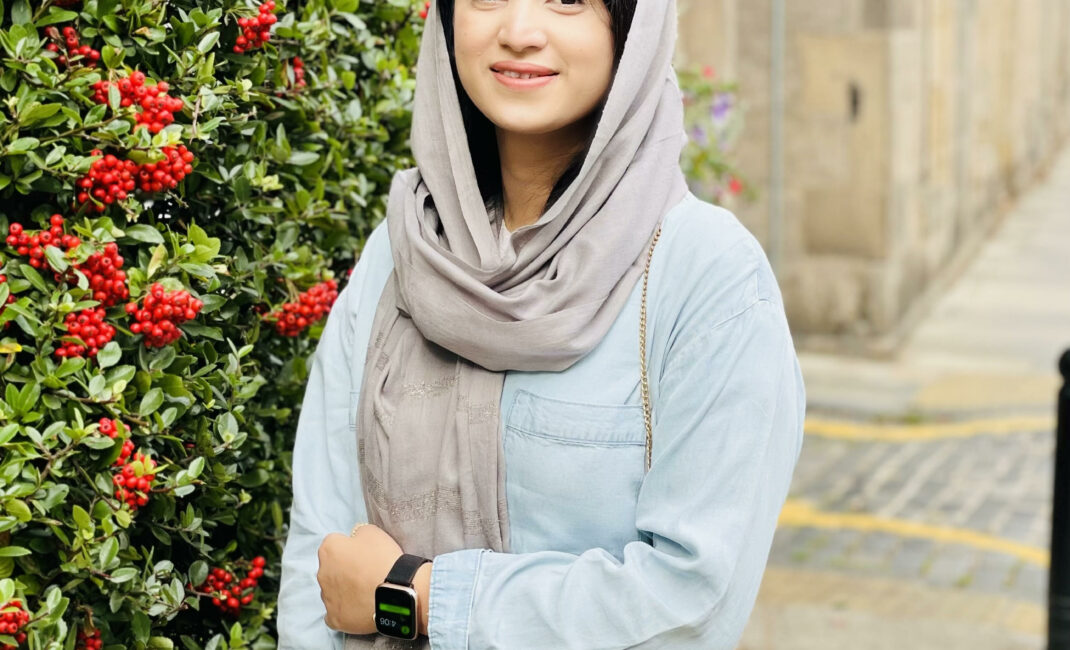
Shazia Ramzan
“I was born in Swat holding my pen and my paper, wanting to learn there. I had ambitions and dreams. I knew what I wanted to achieve when I grew up. With people asking me to leave, it hit me. I thought: ‘Yeah what if I leave? What of [my ambitions] then?’”
Kainat arrived in Wales three months after Shazia, only knowing the words “nice to meet you” because Shazia had taught them to her. A self-proclaimed “Swat-city girl,” she found herself suddenly affronted by the stillness of the Welsh countryside. “It was so disturbing. Super quiet! I couldn’t sleep at night,” she laughs.
Atlantic College is one of many ‘United World Colleges’ dotted around the world. The colleges, whose former president was Nelson Mandela and current president is Queen Noor of Jordan, offer scholarships to a variety of students around the world, from refugees to royalty, with the hope that they will get along and become the next world leaders.
But the mammoth task of learning English whilst studying the demanding IB curriculum and working through trauma did not leave Kainat and Shazia much room for social integration – especially in their first year, where they became frustrated by peers who took education for granted.
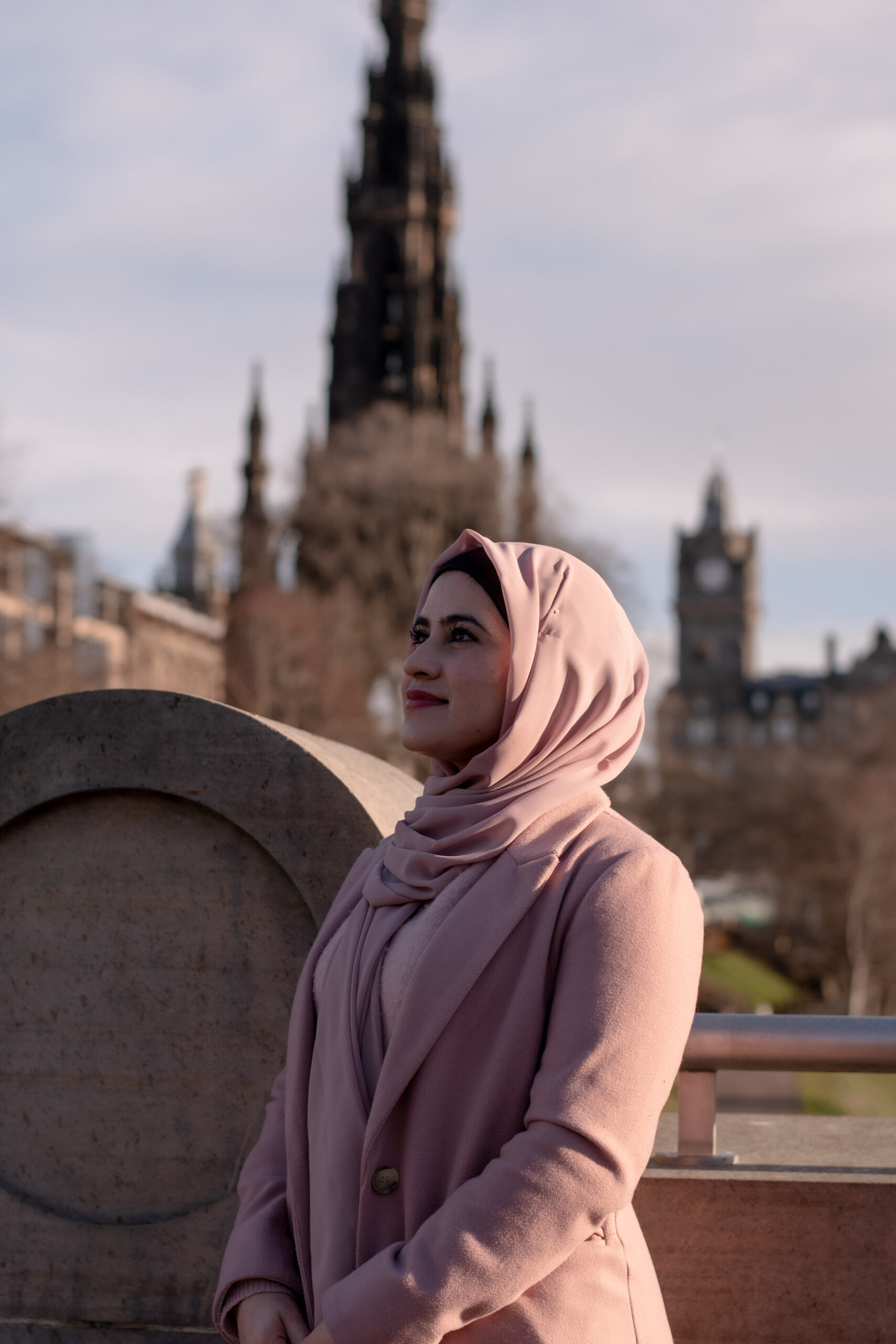
Kainat Riaz
“Everything seemed so easy for [other students],” Kainat recalls. “The education, the parties, and the social life. I’d think life was so perfect for them while I struggled with every phase of mine. I’d blame God for being so unfair – Why us? And why were other people so lucky to have everything, when they didn’t even care about education so much? But for me and for Shazia, we struggled every day. And over the summer, when the others would go home and on holidays, we still had classes.”
“The beginning was very, very hard,” agrees Shazia. “I liked how everyone at the college was equal and that we could do everything. When I think of the freedom and support we had at the college, I feel lucky. I was now in a place where I could breathe freely. Like a free bird, I could fly.
“But when I heard students take it for granted a part of me wanted to speak up and tell them that it is not easy for everybody to get an education and especially at a place like this. I wanted to say: ‘Ask someone who cannot afford to buy a pen, who cannot afford to buy a book, or who cannot afford to buy a uniform. Ask them about the value of education. They would know its value. They would tell you how much they love education and how important it is.”
After grasping English, the pair have fond memories of their later years at the college, where they made close friends and settled into the culture.
Where are they now?
Kainat and Shazia were friends before that day on the van, best friends even. When they were 10 years old, Kainat missed school to be with her mother who was sick and in hospital, so Shazia visited and let her friend copy her homework. From then onwards, they became inseparable. The two shared an upbringing, and a trauma. They left home together and leant on one another. So, it was only natural that they attended university together too. At the University of Edinburgh, they are now studying and training as healthcare professionals. They are also living together along with Kainat’s husband, who she first met at a United Nations event.
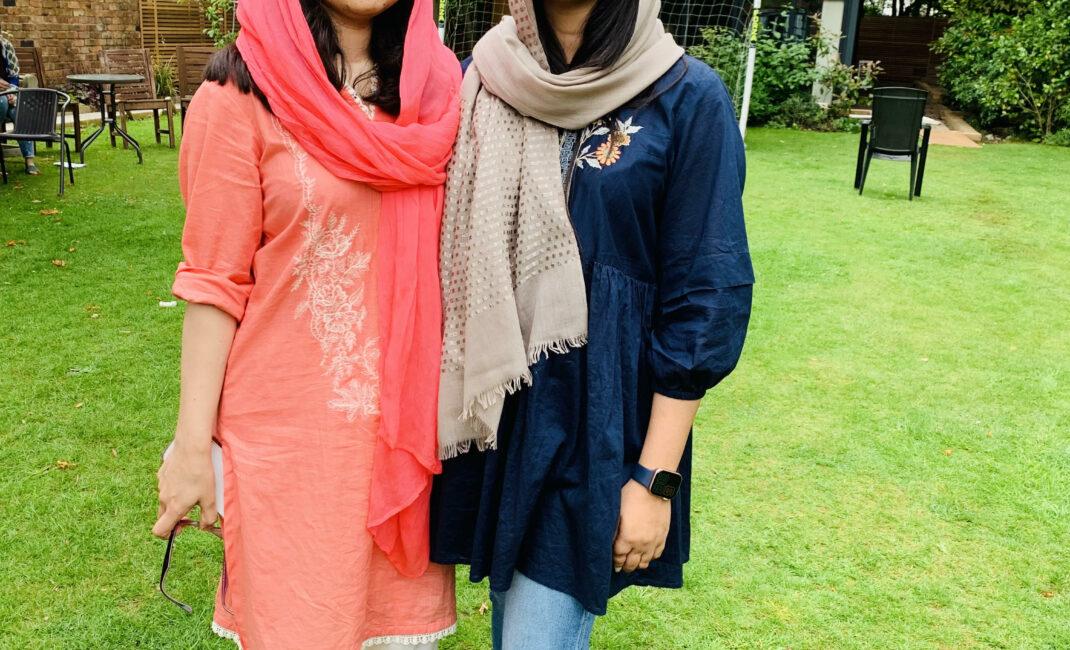
Malala Yousafzai and Shazia Ramzan
Their relationship with Malala, who is now based in London, also continued after the shooting. Kainat says rather matter-of-factly: “We became close after we were shot.” These days they see her less frequently but whenever they can.
“Malala was very young when she came to the UK, so I was a little bit worried about her,” says Kainat. “I didn’t know how she would handle being a public figure, especially with the pressure of her medical treatments. But now, she’s graduated and has the Malala Fund. She has the skills and ability to balance things. She’s confident.”
At just 16, Malala co-authored the international bestseller ‘I Am Malala’. At 17, she became the youngest Nobel Peace Prize winner in history. Last November, at the age of 24, she married her partner, Asser Malik.
Considering Malala’s meteoric rise, it wouldn’t be unreasonable for her school friends to feel some sense of envy.
“I am happy with what was written for me,” says Shazia, simply. “I was never jealous of Malala. I never thought ‘she’s a celebrity and I’m not’. I am grateful for what I have and for the work she has done fighting for our rights. She deserves it all.”
When Malala took to the stage in Oslo to receive her Nobel Peace Prize, her two school friends were sitting in the audience supporting her. In her speech, Malala told the world: “I am not a lone voice. I am many. I am Malala, but I am also Shazia. I am Kainat.”
Kainat, Shazia, and Malala, forever intertwined by the events of the day on the van, share a determination to continue advocating for women’s rights and education.
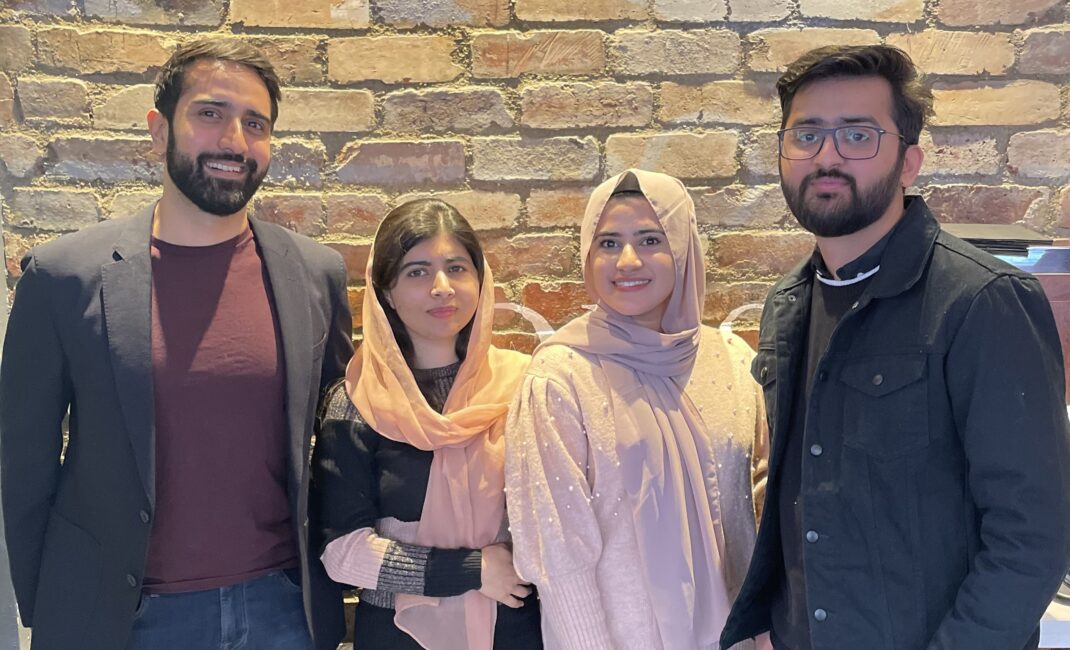
Asser Malik, Malala Yousafzai, Kainat Riaz and Kainat’s husband Ijlal
Alongside her studies, Kainat is the co-founder and director of Beydaar Society, a youth-led organisation working to promote peace and harmony in Pakistan through education. “Once I graduate, I would love to go back to my hometown and work in education,” she says.
Shazia hopes to do the same. Thinking back to her 13-year-old self, the little academic, I wonder what that girl would say to the woman she has become.
Shazia pauses and says: “You’ve achieved it. Your journey was hard, and you deserve to be here.”
